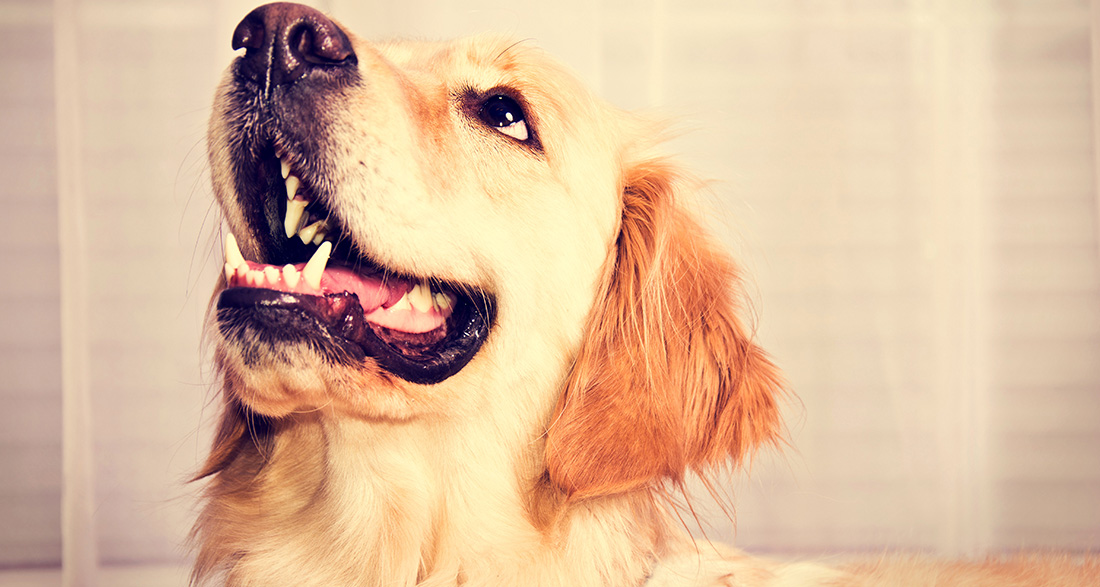When a dog frequently smacks, licks its mouth, or excessively swallows, it can have quite harmless reasons. However, there might also be a serious underlying illness. In this article, we want to explain in more detail what could be causing your dog to smack a lot.
Harmless Reasons for Constant Smacking in Dogs
In general, there are four main reasons why dogs may smack a lot in their daily lives: anticipation of food, relaxation, boredom, and enjoyment. Usually, the dog smacks for a few moments and then stops on its own.
Excitement for Treats
In most cases, there’s no serious illness behind a dog smacking a lot. Often, the smacking just means the dog is excited about getting a treat. A classic scenario is when a person goes to the place where treats are usually stored. The dog immediately knows: I’m about to get a treat! The dog’s mouth literally starts watering, and it begins to smack. This also applies when preparing regular food.
Dog Smacks During Sleep
Another situation where dogs smack a lot is during the falling-asleep phase. When the dog lies down in its familiar sleeping spot, licks its mouth, and smacks softly, it is usually a sign of calm and relaxation. So, again, no need to worry!
In general, during relaxation phases, dogs may experience moments where they smack and lick themselves. We’re familiar with this situation not only in dogs but also in small children who often smack when falling asleep. The exact reason for this behavior hasn’t been definitively explained, but experts believe it is a regular form of relaxation. Is your dog smacking at night? It’s not unusual in this case.
Dog Smacks While Being Petted
Some dogs may smack when being petted—this, too, is a form of relaxation. Through smacking, the dog is communicating to its owner that it thoroughly enjoys the situation while expressing affection.

Boredom
A less pleasant reason, though not a serious illness, is smacking due to boredom. If the dog doesn’t know what to do with itself and is under-stimulated, it may start smacking excessively. In such cases, providing puzzle toys, offering a chew bone, or going for a walk can be helpful.
Food Residues Between Teeth – the Dog Constantly Smacks
Another reason causing a dog to smack is irritating food residues in the mouth. Since the dog doesn’t have toothpicks, it tries to remove any potential food particles by producing saliva. Since smacking stimulates saliva production, many dogs tend to smack a lot when there are bothersome food residues between their teeth.
In these situations, smacking often lasts longer than in classic relaxation phases or when anticipating food. Therefore, it makes sense to inspect the dog’s mouth more closely—after all, besides food residues, other foreign objects might be stuck between the teeth.
Once the food residues or foreign objects are removed, the dog’s smacking usually stops quite quickly. Valuable information on suitable types of food and detailed reviews can be found on Dog Food Tests.
Serious Causes of Frequent Smacking in Dogs
Diseases of the Mouth and Throat:
If a dog frequently licks its snout or smacks a lot, there might be an underlying disease in the mouth and throat area. The most common pathological cause for frequent smacking in dogs is issues with the gums.
Gum inflammations can occur acutely due to gum injury or chronically, often caused by tartar, disrupting the balance in the mouth. Besides gum inflammations, other diseases in the dog’s mouth and throat can be responsible for frequent smacking:
- Abscesses: Recognizable as small ulcers that cause pain due to pressure and inflammation. Abscesses need to be cut open, cleaned, and sometimes stitched for complete healing.
- Damaged Teeth: Often, broken teeth, where the root neck may be exposed, can be a reason for frequent smacking. In some cases, the tooth can be repaired, but usually, it needs to be completely removed.
- Root Infections: Similar to humans, dogs can experience root infections causing severe pain. Often, affected teeth need to be extracted.
- Tonsillitis: If the dog’s tonsils are inflamed, they can also be a source of pain. Removing the tonsils can provide relief.
- Tongue Diseases: Injuries to the tongue are often very painful but usually heal quickly. In severe cases, the dog may need additional antibiotic treatment.
- Tumors in the Mouth and Throat: Naturally, dogs can also suffer from cancer that spreads in the mouth and throat. This includes tongue tumors, palate tumors, or tumors in the dog’s throat.

If the dog smacks frequently, a thorough examination of the mouth and throat is advisable. Gum inflammation can usually be recognized by a discoloration of the gums, which should normally have a healthy, pink color. Inflamed areas are often less well-perfused and therefore appear brighter. Injuries, on the other hand, are not always immediately visible. In case of persistent complaints, the dog should be taken to a veterinarian promptly.
Tip:
To prevent diseases in the mouth and throat, it is advisable to avoid the development of tartar as much as possible. Chewing on hard, uncooked bones has proven particularly effective, but for susceptible animals, thorough dental care may also be necessary. Consult with your veterinarian to determine the best dental care options for your dog.
Gastrointestinal Diseases as a Cause
Dogs have very limited ways of letting us know if something is wrong with them. Therefore, it is crucial for us to pay attention to any changes in the behavior of our four-legged friends.
Frequent smacking in dogs may indicate serious problems with the gastrointestinal tract. Even with mild stomach pains, many dogs tend to smack constantly. Digestive problems and more dangerous diseases can be the cause if the dog is smacking constantly:
- Diarrhea: If the dog is suffering from diarrhea, discomfort can lead to excessive smacking.
- Vomiting: Generally, stomach problems of any kind can be a possible trigger for frequent smacking in dogs. Additionally, the dog might try to remove harmful stomach acid from the mouth through increased saliva production and frequent smacking.
- Flatulence: Bloating can occur in the stomach or directly in the intestines and is always unpleasant for the animal. This can also manifest as frequent smacking.
- Excess Stomach Acid/Heartburn: Excessive stomach acid rising in the esophagus can trigger uncomfortable heartburn in dogs. This can also be a reason for frequent smacking. In this case, it is often sufficient to put the dog on a special diet for a few days or switch to a different type of food.
- Sluggish Gastrointestinal Tract: If the dog’s gastrointestinal tract cannot fully process food, this may also cause pain in the animal. So, this is another possible reason for frequent smacking.
- Gastric Torsion (Bloat): Gastric torsion is an extremely dangerous disease that is often only recognized when it is almost too late. If the dog starts smacking constantly and doesn’t stop, a visit to the veterinarian is always helpful to determine the exact causes. In the case of gastric torsion, every minute can be crucial to save the animal’s life.
- Gastritis: When the stomach is inflamed, it causes severe pain in dogs. In addition to other symptoms, such as bloody stool, gastritis in dogs can also lead to frequent smacking.
- Tumor Diseases: Under certain circumstances, behind external symptoms like frequent smacking in dogs, there might also be a serious tumor disease that should be treated promptly. If the dog’s smacking persists over the long term, a thorough examination should be conducted to possibly detect tumor-like changes in the gastrointestinal tract.

Most diseases in the gastrointestinal tract of a dog are often accompanied not only by constant smacking but also by many other complaints. Diarrhea and vomiting, for example, can also be signs of a more serious condition and should be considered only as additional symptoms rather than an independent illness in such cases.
If the dog frequently smacks and possibly shows additional symptoms, a visit to the veterinarian is essential. It is crucial that you describe all symptoms accurately so that the veterinarian can immediately gain an overview of potential diseases and search for them specifically.
Metabolic Diseases and Autoimmune Diseases as Causes
In addition to the mentioned conditions that can trigger constant smacking in dogs, there are other diseases to consider. These include metabolic and autoimmune diseases, which are often not immediately apparent. Such diseases are usually identified when the dog visibly weakens, becomes lethargic, and loses weight.
Metabolic and autoimmune diseases are rarely curable but can potentially be managed with medications. A comprehensive anamnesis must take place first, ruling out other diseases.
It’s often the subtle details and behavioral changes that indicate metabolic and autoimmune diseases. If your dog exhibits additional symptoms alongside frequent smacking, it’s crucial to inform your veterinarian.
Incorrect Diet
Another potential cause could be the current dog food being fed. Symptoms are often observed when feeding dry food, causing an unfavorable pH level (acidification) in the dog and leading to increased belching and smacking. Switching to a different dry food or, preferably, high-quality wet food can provide relief.
How is Frequent Smacking in Dogs Treated?
Frequent smacking in dogs does not necessarily require treatment, especially if it occurs during sleep or for other harmless reasons. However, when dogs smack frequently due to physical causes, intervention may be necessary.
While food residues in the mouth can usually be easily removed by the owner, requiring minimal intervention, more serious diseases often require additional support.

Treatment with Healing Clay
For mild gastrointestinal conditions, such as diarrhea, vomiting, or bloating without serious underlying causes, healing clay is often a good option to provide relief. Healing clay soothes the gastrointestinal tract and regulates the natural gut flora, calming the entire digestive system of the animal. However, it is not suitable for long-term feeding.
Dietary Change
If smacking persists even after a course of healing clay, considering a dietary change to better-quality food is an option. Switching from dry to wet food or introducing more variety in the diet can often be helpful.
When to Consult a Veterinarian?
If a more serious health issue cannot be ruled out as the cause of frequent smacking in dogs, a visit to the veterinarian is essential. Since not only harmless causes and mild diseases can be behind frequent smacking but also potentially dangerous conditions, the focus is always on searching for possible causes.
If, however, dental pain or minor mouth injuries are the triggers for the dog’s frequent smacking, opting for softer food for a few days that spares the affected gums might help. If an infection is present, antibiotic treatment is necessary and should be administered by an experienced veterinarian.
It is important to observe your beloved furry friend as closely as possible and note the slightest changes in behavior. Also, it is essential to distinguish whether frequent smacking is a habit that occurs in the same situation and can be easily trained out or if it is a new behavior that happens frequently and independently of the situation.


